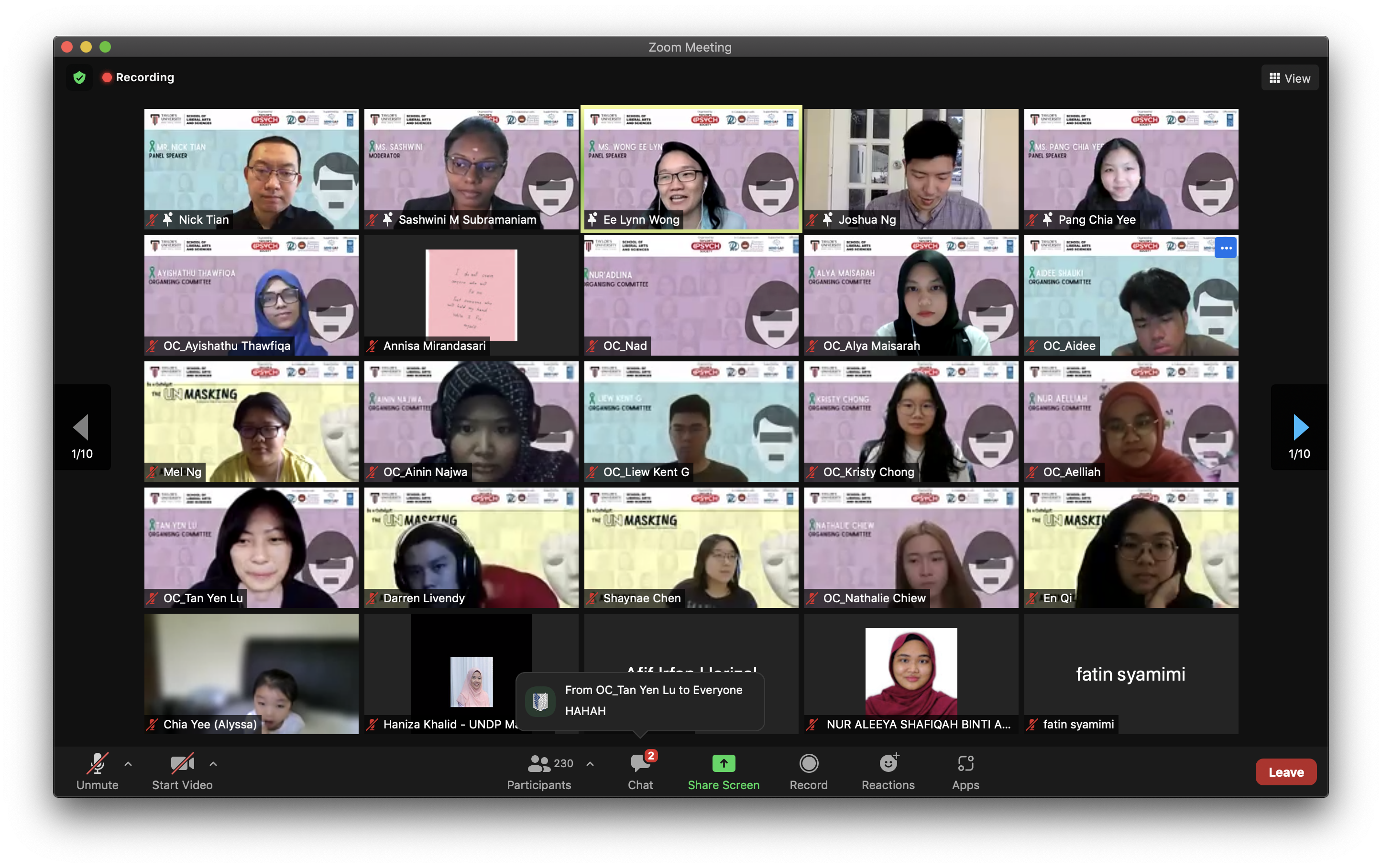By Annisa Mirandasari
KUALA LUMPUR, 10 October 2021: In honour of the World Mental Health Day, the mental health issues caused by the pandemic were addressed during the forum œBe A Catalyst: The Unmasking organised by Taylors Psych Society of Taylors University in collaboration with Universiti Pendidikan Sultan Idris (UPSI) today.
The panelist came from different fields, Ms. Pang Chia Yee, a PhD student and lecturer at Taylors University; Mr. Joshua Ng, the Co-Founder of Mind Gap and Sports Psychologist, Ms. Wong Ee Lynn, the clinical psychologist at InPsych Psychological and Counselling Services; and Mr. Nick Tian. a master’s student and provisional psychologist in Australia,
Opening the discussion, Mr. Nick stated that in order to manage our mental health during the pandemic, we need to mimic our in-person activities and transfer them into virtual form so that we still have a sense of connection and belonging.
œIf you are an active person, you can stay active by joining group sessions online, said Mr. Nick.
Ms. Ee Lynn continued the session affirming that we need to have a mindset that it is okay to step back and there is no need for us to be strong all the time, specifically mentioning œtwo steps front and one step back as an acceptable form of coping strategy.
When asked how we have changed our working scheme post-COVID, Mr. Nick mentioned, œThe hybrid working mode gives flexibility for us to choose our work mode, but there might be a bit of the challenge for management level to create a sense of belonging and emotional relation with one another.
Ms. Ee Lynn went on to say that, as a result of COVID-19, she had to change her therapy sessions from face-to-face to online, and that applying it on children required more time and effort.
Furthermore, the speakers discussed the challenges posed by COVID-19. Ms. Pang pointed out that just turning off the cameras during virtual meetings established boundaries.
To address the problem, Mr. Nick suggested that we take some time to get back to our pre-COVID days of human-to-human interaction. Ms. Ee Lynn also expressed her thoughts on the subject, noting, “The pandemic babies might face issues when they start to come out to the outside world. […] Children will have it hard to mingle around once they go back to school.
It is then supported by Mr. Joshua who spoke from athletes viewpoint, œOnline social groups might work, but getting together is still important. Athletes have bootcamps in order to have the much-needed physical contact.
Moreover, in response to the negative stigma of mental health disorders as a weakness, Ms. Ee Lynn responded, œIts just like a normal cold or flu, how is it a flaw? œThose who come and seek help, willing to stand front and deal with their problems are actually the strong ones, she continued.
Additionally, Mr. Joshua stated that he sought to provide a safe environment for the athletes to express their vulnerabilities and difficulties so that they did not pile up.
Mr. Tian also went on to say that the COVID-19 crisis is a perfect opportunity to address mental health issues since people are becoming more aware of how important they are.
The discussion then moved on to “the Unmasking,” a session in which survivors of mental illness shared their experiences. The audience is presented with two anonymous stories.
Ms. Pang finished the discussion by saying, “When people come out to you, don’t give them advice. Just hear them out and be there for them. In addition, Mr. Joshua also noted, “By asking them what they need, you’ll get clarity on the kind of persona you need during that interaction.
The panelists concluded the session by reminding the audience that it is okay to show their fragile side and seek help for it.
“Be A Catalyst: The Unmasking” forum was officiated by the senior Development Economist for UNDP Malaysia, Singapore, and Brunei Darussalam, Dr. Hazina Khalid and the participants number peaked at 242 people. It was held on Zoom and lasted for two hours.***
